- Home
- Adam Thorpe
Flight Page 2
Flight Read online
Page 2
‘Because it’s November in Denmark,’ Bob said, ‘and you’re missing base.’
‘I am usually too chilly at base, with all that overdone air con.’ He leaned forward and put a plump hand on his captain’s knee. ‘By the way, are you married?’
Bob glanced at the door, almost indistinguishable from the walls in the poor light. Nothing until now had ever suggested that he was anything more to the prince than a minor member of his vast entourage.
‘Right now I’m in the middle of a divorce, Your Excellency. It’s fine. I mean, it’s not sticky. Painful, but straightforward.’
The hand left the knee.
‘Painful?’
‘I still love my wife.’
‘I suppose she has a job?’
Bob explained: she had been a BA senior flight purser, left her job to bring up their twins, studied with the Open University for a business-studies degree, put it into practice by selling smart once-worn cast-offs – Chanel, Jaeger, Saint Laurent – from their front living room, and then opened her own shop in downtown Worcester, called Holier Than Thou.
The prince, who had three wives, gave a non-committal nod. ‘I will tell you why we’re meeting in here. Because here no one will be listening to us.’
‘That suggests we’ve got something worth listening to.’
‘Exactly.’ The prince twitched his nose, reflected. ‘Captain Windrush, Winrush, whatever, have you got enemies?’
‘Why, have you?’
‘I asked you first, Captain.’
Bob’s throat was dry. He hadn’t drunk enough during the flight from Paris, fretting about the dodgy valve. And now it was hard to distinguish his heart from the distant knocking of the repair job, making its way through the aluminium tube of the fuselage to this tiny sweltering pod.
‘I think you’ve been watching too many TV dramas, Your Excellency.’
Watching TV dramas (on various huge widescreens, two of them on board) was exactly what the prince did spend most of his time doing, while being paid a fortune for not working as a corporate executive in several Dubai companies. Bob had made a gaffe.
‘In TV dramas,’ said the prince, eventually, wiping his face with his towel and so revealing a groin demurely shielded by his belly, ‘the journalist seeking information is usually a beautiful young blonde with perfect dimples, so one does not mind being badgered. In this case, it’s a male Jew with glasses.’
‘An Israeli?’
‘I prefer the term Jew. He came to see me in Dubai two weeks ago. Just before we left for Paris. He claimed to be a restorer, interested in one of my broken Florentine putti. Once we are alone, this fellow says very smartly that he is in fact a journalist, a journalist for a left-wing paper in Tel Aviv, that he believes a certain Robert Windrush is working for me, and that he needs to know your whereabouts. Now I know our agreement, when you joined me, was that your contact details should never be given to the press, nor to anyone else for that matter. As much for my benefit as yours. And the idiot did not even know about our address system.’
Bob smiled, despite himself. Dubai had no postcodes and few street numbers; it was all PO boxes or a map drawn on the envelope. Underneath, the city was still nomadic – built on shifting sands. Nevertheless, he’d been there two years and felt almost settled. He liked the plane, the undemanding regularity of being a winged chauffeur, even the managing of the crew.
‘Not much of a journalist,’ he said.
‘I can’t even check that out,’ the prince frowned. ‘When I asked him for his name in turn, he refused. All he said was that his investigation would destroy – crush, was the term he used – the present ultra-right government in Israel. No doubt an exaggeration, but still.’
‘Investigation?’
‘Of a certain arms deal.’
‘Old, old news,’ Bob said, watching the sweat well up from nowhere on his thighs.
The prince blinked slowly. ‘I think he felt it would encourage me,’ he went on. ‘It did quite the opposite. I asked him if he feared Mossad. Here in Dubai, I told him, we know all about Mossad. He said Mossad do not target Israelis. Sheena put her chin on his knees and I think he was more frightened of her than of any secret service.’
Sheena was a cheetah. The prince kept a number of juvenile big cats in cages, and would let one loose in his office to impress visitors. It had always impressed Bob. ‘I told him he was foolish even to think about it,’ the prince sighed, wiping his glistening face. ‘Does any of this make sense? I see you are sweating.’
Bob chuckled dutifully and wiped his face in turn, heedless of nakedness now.
When all this tricky business had first brewed up two years ago, he had cleaned and oiled his pistol – the old Bulgarian Makarov picked up in Liberia – and fired it into water: the expanding bullet’s splay was like orange blossom made out of metal. He saw it now entering his flushed thigh and flowering out and doing an awful lot of damage. And it wouldn’t just be one, and certainly not in the thigh. They might not even bother to waste a bullet; smothering was more their style. The journalist would probably be hit first, but that was meagre comfort.
‘Your Excellency,’ he said eventually, ‘I am very grateful to you for telling me this. And, I presume, telling the journalist nothing.’
The prince settled back, looking cross. ‘I don’t have the slightest idea of what deal the Jew was referring to.’ He reached up and turned the dial clockwise a few notches. ‘Have you ever overshot the runway, Captain?’
Bob thought at first he was speaking metaphorically, but the prince generally stuck to traditional metaphors to do with tents, moons, oases, camels and desert blooms. Bob took a deep breath, parboiling his sinuses.
‘When I was knocking about in Africa,’ he admitted, ‘my wheels did carve my name in the airstrip’s grass a few times. And back in my commercial airline days, flying a BAC 1–11, I rattled some chimney stacks when the water injection system failed, as it had a tendency to do.’
He looked up. Sheikh Ahmed was sitting back with his eyes shut, sweat trickling down his sideburns, dripping off his chin, seaming the folds of his belly. ‘Don’t leave the job before you’ve flown me home, will you, Captain Winrush? Your co-pilot cannot do it on his own.’
Bob frowned, his guts turning a flip. He allowed a little hot silence to fall. ‘I had no intention of leaving the job, Your Excellency.’
There was another pause. ‘Well, you realise my difficulty.’
‘What?’
The prince opened his eyes, angled his head with a sad smile, spread his hands wide, then went shut-eye again.
‘I think in plain English,’ said Bob, ‘we call this firing somebody?’
There was a slight frown above the dark lids. ‘Let’s call it reluctantly letting you go, for your own welfare.’
‘Ah, right. Compassionate leave.’
The joke was lost somewhere in the sweaty blur, or maybe in the cultural chasm that lay between them in spite of their similar schooling. The sheikh nodded. ‘Yes, it makes my heart awfully sore, but there we are. The nail-bed of life. Just take me home first, Captain. My secretary will do the rest. Concerning you, I mean.’
Since the prince had some twelve homes in twelve far-flung locations, Bob very much hoped he still meant Dubai, where the ejected pilot’s principal belongings awaited him on the twenty-fifth floor of a block with a view of the usual construction site, rumbling and ablaze at night. As for his own home, in the proper sense of the word, he had no idea where that lay, not these days.
‘I see your point, Your Excellency. What a shame. There goes my long service award. Just give me a letter of reference. My impeccable landings.’
‘Of course.’ Sheikh Ahmed opened his eyes and stood up, the towel thankfully in place. He stared at Bob. It wasn’t an Emirati-style joke, after all. ‘Jacuzzi? You must tell me what exactly you got up to, knocking about in Africa.’
His gaze was fixed, his face unsmiling: nothing on the clock except the maker’s nam
e in Arabic, as the expression goes.
He smoked in the jacuzzi: a Dunhill Infinite whose ash swirled into the bubbles. Bob refused the offer, as if out of principle.
‘I think I know what pile of ordure this journalist is sniffing around, Your Excellency. When I was doing freight, I made a mistake. I walked away from a deal.’
‘When?’
‘Year before last. Just before I joined you.’
‘Cigarette?’
‘No, thanks.’
What he wanted was water. The prince was drinking a chilled bottle of sparkling, but had failed to offer one to his pilot. Perhaps it hadn’t occurred to him. ‘Why did you walk away?’
‘It wasn’t my deal: a freight dog is just a flying truck driver.’ He felt grumpy, but decided to overcome it. The prince was not someone you could make an enemy of. ‘The deal bothered me. I can’t tell you what the deal was, but let’s say that money throws bridges over geopolitical gulfs, makes arch-enemies into clients, and this particular deal went right up to the highest levels.’
‘Of the Israeli government?’
‘Don’t go there. It’s not worth it. Pursue your enquiries elsewhere. We’re off the blocks in an hour. My job is to fly you safely back to base without spilling a drop of this fine jacuzzi, and then walk off into the sunset. Right?’
His Excellency smiled and drew deeply on his cigarette: it smelt very costly. Bob still hoped the walking barrel would change his mind, so kept polite. He let the water jets pummel his broad shoulders, tried not to think of the future, of being thrown back yet again into freight, its dodgier tributaries. The surging waters turned the prince’s chest-hair to straggles, like the beard found on mussels.
As they were towelling themselves dry in the changing room with its cream-leather pouffes, the prince pointed to Bob’s right leg.
‘I see you have a history, too, Captain. I had noticed you were ever-so-slightly lame.’
Despite the cooling bubbles, the sauna’s heat had retained itself as a flush everywhere but on the old wounds, so they snaked their way happily over Bob’s calf and shin like white nylon cords, with a shiny granny knot over the knee. At times the scars would turn dark red, like strips of salami.
‘Never make a landing in the Congo forest in the rainy season unless you have floats in place of wheels,’ he explained. ‘Not with a DC-10, anyway. A Cessna or a Cherokee, maybe. They told me the airstrip was hardened and it wasn’t. Builders’ mud, basically.’
‘Then you did more than carve the grass,’ the prince said with a slight air of rebuke.
‘It wasn’t a question of overshooting. We just lost it. Skidded. There was a tree in the way. It sheared off the aft end of the fuselage. To be honest, she was no great loss: she’d had the arse flown out of her. Purchased with two years of life left, and we’d done eighteen months. Much more and she’d have joined the notorious fleet.’
‘And what is that, Captain?’
‘Ageing freighters whose entire makeover consists of repainting the registration letters on the tail. I know the feeling.’
When the prince asked him what the cargo was, with the air of a man who knows the world, Bob gave him the usual spiel about building materials for a sawmill, how in crashing it they’d saved a lot of trees. By now the man had donned his snow-white dishdasha, slipped his ghutra over his head – and looked like any other sheikh: one of those fat white queen ants fussed over by everyone else.
As they walked down the aisle past the bedroom suite and the two lounges, past the galley gleaming with stainless steel and the dining area with its medieval crossbow collection, past the TV room with its Blu-ray and four giant speakers and library of crap DVDs, the prince never once turned his head. By the time the two men reached the flight-deck door, he was the flight’s self-loading cargo and Bob was just the thirsty cameleer. Servants and their masters never, in the end, mix.
About ten hours later they made their approach into Dubai against a strong wind made more interesting by sand. Bob thumped it in somewhat after a gust dropped them suddenly.
‘The goodbye bump,’ said François.
Bob hadn’t mentioned being shown the door, of course, only that an opportunity had cropped up.
‘And now the goodbye drink, skipper?’
They went as usual to Caspar’s, a club the prince started a few years back and to which of course they had free membership. The floors were slate, the tables teak, the walls purple-lit, with a glass wall fronting the outdoor pool and its free viewing of the local talent in what were, apparently, very expensive bikinis – which, given their minimal surface area, they must have been. They settled in one of the sofas closest to the glass, metaphorically pressing their noses against the sweet-shop window. François was about forty and not yet at the age where girls seem to get more and more attractive, but his preppy air concealed an aficionado. It also concealed a somewhat disreputable past, as far as Bob could gather, including a narcotics run in a twin-engined Cessna that came down over Kentucky. Bob never wanted to probe: drug-trafficking was way outside his envelope.
‘Resigning so soon is not good,’ François commented. ‘You will put a bullet in your feet.’
‘Maybe. Anyway, I didn’t have a choice.’
‘That is not resigning, then.’
‘Whatever. Keep it to yourself.’
The Belgian looked at Bob in his usual nonplussed way. ‘So, I will keep mute.’
Bob made sure he eked out the Scotch, as his tongue had a tendency to wag under the influence, and he felt this might not be a good idea. François had heard most of his stories, including the one about tantric Luke, and had suffered his glooms in the cockpit during the worst moments of the divorce: perhaps the man didn’t mind the prospect of a new skipper.
At any rate, instead of weeping over the departure, he spent the rest of the hour ogling the costly bikinis while Bob pretended to know some of their contents: ‘Oh, look, that’s Olga, from Bucharest or somewhere. And there’s Leonora, she of the perfect shoulders. And if that isn’t Jessica, the pearl still in her navel, I see.’ As François began to inveigle himself with a Latvian dish working the tables, his skipper slipped away, barely saying goodbye.
There had been equally little regret from the prince, emerging from his suite as they were taxiing to the GA apron. He was planning to enjoy the next fortnight in his miniature antiquities-bloated Versailles the other side of the city, so the impromptu loss of a pilot hardly ruffled him. There were hundreds queuing up for the job, younger and perfectly qualified, and his fleet’s young ops manager, Greg Tennyson, had all the usual contacts.
Perhaps that’s why the boss left the plane without a glance, although the captain stood by the cockpit door like a waiter expecting a tip. Or an apology. Bob wished His Excellency an afterlife of a permanent holy month where the sun never set: no food, chewing gum, drink or girls. Or water.
He was nervous, standing outside the glass tower of his apartment block. It was late, and the nights were beginning to cool, but the breeze felt very warm after Paris, the smell of the desert always strongest in those first hours of arrival. He craned his neck to count the floors up to his own: the apartment was dark behind the dazzle of reflected crane-lights. Couples passed on foot, laughing, along with the usual two-bit Ferraris with their sonic booms of inboard music. He’d parked the Audi (not really his – it came with the job) in the block’s underground car park, but had avoided the lift. Instead, he’d taken the fire stairs and emerged in the service area at the side, which always smelt of sick.
I’m small fry, he thought. I’m below their radar. I’m as small as a grain of sugar in a crate, even as small as the cannabis crumb the Dubai customs men found one day on the sole of a shoe – whose owner thereby copped four years in an Emirates prison. How do you know when you matter to someone? When he was on the flight deck he mattered a great deal, especially in the days when his cargo was hundreds of men, women and children. Even when it was freight, he mattered. Mattered more than pr
esidents, but probably not more than surgeons. This mattering business was what made him addicted to the job – along with the actual flying.
The lobby was empty apart from the porter, Vakim, who doubled as the security man. He asked Vakim if anyone had asked for him while he was away. ‘No, sir,’ Vakim said, flustered because he’d been watching the TV behind his desk, had not noticed Bob coming in, the sigh of the sliding doors inaudible under the murmur of an Arabic soap. The little fountain trickled, its pool brimming flush with the lobby’s tiles: it was the only feature he liked about the lobby, which otherwise reflected the prince’s taste for mirrors, pointy shapes and much gold on much black. ‘Are you sure, Vakim?’
‘Certain, sir. Apart of your friend.’
‘What friend?’ As if he didn’t have any. He was already chilly in his short sleeves, whose epaulettes Vakim’s eyes would always stray over, his own being merely decorative. ‘Which of my many friends, Vakim?’
‘Mr Sharansky, sir.’
‘I don’t know a Mr Sharansky.’
Vakim smiled, a bad sign. ‘He said he knows you very well, he was one in your family.’
‘I have no family apart from my grown-up children. When was this?’
It was the day before yesterday, the caller sounding American – although Vakim was unreliable on this; he had once thought Bob Winrush was American.
‘Did he leave a card, Vakim?’
‘No, sir. Just this message and this telephone number. I told him the day on when you were … returning. Which is this day, in fact,’ he added with a sharp laugh.
Bob took the slip of paper and wondered why Vakim hadn’t given this to him straightaway. Maybe he’d learnt suspense from all those soaps. The note was headed URGENT in Vakim’s awkward hand, and asked Bob to phone the number below on his return. It was signed (in block capitals) MATT SHARANSKY. The name had a faintly Israeli ring.
The lift doors slid open and Bob swivelled round and a woman he recognised as being a resident clicked out on high heels, her small but exquisite fluff of a dog in tow. Tomorrow he was due to brave the cheetahs, sorting out his forced departure with the prince’s busty green-eyed secretary.

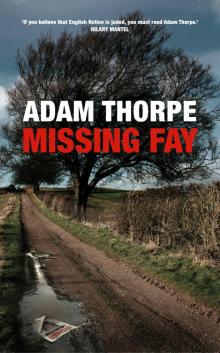 Missing Fay
Missing Fay Hodd
Hodd Pieces of Light
Pieces of Light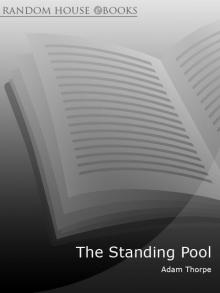 The Standing Pool
The Standing Pool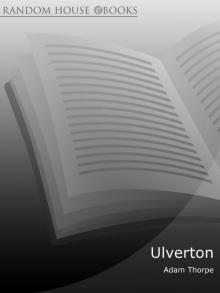 Ulverton
Ulverton Nine Lessons From the Dark
Nine Lessons From the Dark Flight
Flight The Rules of Perspective
The Rules of Perspective From the Neanderthal
From the Neanderthal Is This the Way You Said?
Is This the Way You Said?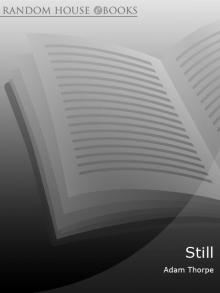 Still
Still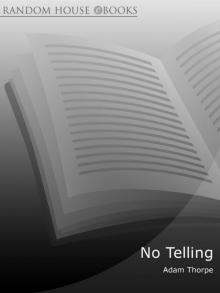 No Telling
No Telling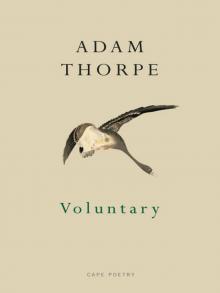 Voluntary
Voluntary Between Each Breath
Between Each Breath